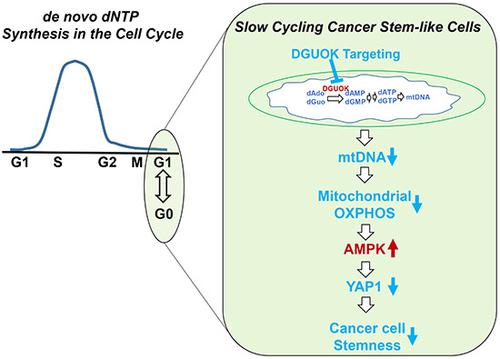当前位置:
X-MOL 学术
›
EMBO Mol. Med.
›
论文详情
Our official English website, www.x-mol.net, welcomes your
feedback! (Note: you will need to create a separate account there.)
The mitochondrial deoxyguanosine kinase is required for cancer cell stemness in lung adenocarcinoma.
EMBO Molecular Medicine ( IF 9.0 ) Pub Date : 2019-10-21 , DOI: 10.15252/emmm.201910849 Shengchen Lin 1 , Chongbiao Huang 2 , Jianwei Sun 1, 3, 4 , Oana Bollt 5 , Xiuchao Wang 1, 2 , Eric Martine 1 , Jiaxin Kang 1, 4 , Matthew D Taylor 5 , Bin Fang 6 , Pankaj K Singh 7 , John Koomen 6 , Jihui Hao 2 , Shengyu Yang 1, 8
EMBO Molecular Medicine ( IF 9.0 ) Pub Date : 2019-10-21 , DOI: 10.15252/emmm.201910849 Shengchen Lin 1 , Chongbiao Huang 2 , Jianwei Sun 1, 3, 4 , Oana Bollt 5 , Xiuchao Wang 1, 2 , Eric Martine 1 , Jiaxin Kang 1, 4 , Matthew D Taylor 5 , Bin Fang 6 , Pankaj K Singh 7 , John Koomen 6 , Jihui Hao 2 , Shengyu Yang 1, 8
Affiliation

|
The mitochondrial deoxynucleotide triphosphate (dNTP) is maintained by the mitochondrial deoxynucleoside salvage pathway and dedicated for the mtDNA homeostasis, and the mitochondrial deoxyguanosine kinase (DGUOK) is a rate-limiting enzyme in this pathway. Here, we investigated the role of the DGUOK in the self-renewal of lung cancer stem-like cells (CSC). Our data support that DGUOK overexpression strongly correlates with cancer progression and patient survival. The depletion of DGUOK robustly inhibited lung adenocarcinoma tumor growth, metastasis, and CSC self-renewal. Mechanistically, DGUOK is required for the biogenesis of respiratory complex I and mitochondrial OXPHOS, which in turn regulates CSC self-renewal through AMPK-YAP1 signaling. The restoration of mitochondrial OXPHOS in DGUOK KO lung cancer cells using NDI1 was able to prevent AMPK-mediated phosphorylation of YAP and to rescue CSC stemness. Genetic targeting of DGUOK using doxycycline-inducible CRISPR/Cas9 was able to markedly induce tumor regression. Our findings reveal a novel role for mitochondrial dNTP metabolism in lung cancer tumor growth and progression, and implicate that the mitochondrial deoxynucleotide salvage pathway could be potentially targeted to prevent CSC-mediated therapy resistance and metastatic recurrence.
中文翻译:

线粒体脱氧鸟苷激酶是肺腺癌中癌细胞干细胞所必需的。
线粒体脱氧核苷酸三磷酸(dNTP)由线粒体脱氧核苷挽救途径维持,致力于线粒体DNA稳态,而线粒体脱氧鸟苷激酶(DGUOK)是该途径中的限速酶。在这里,我们研究了 DGUOK 在肺癌干细胞样细胞 (CSC) 自我更新中的作用。我们的数据支持 DGUOK 过度表达与癌症进展和患者生存密切相关。 DGUOK 的消耗强烈抑制了肺腺癌肿瘤的生长、转移和 CSC 的自我更新。从机制上讲,DGUOK 是呼吸复合物 I 和线粒体 OXPHOS 的生物合成所必需的,而 OXPHOS 反过来又通过 AMPK-YAP1 信号传导调节 CSC 的自我更新。使用 NDI1 恢复 DGUOK KO 肺癌细胞中的线粒体 OXPHOS 能够阻止 AMPK 介导的 YAP 磷酸化并挽救 CSC 干性。使用多西环素诱导的 CRISPR/Cas9 对 DGUOK 进行基因靶向能够显着诱导肿瘤消退。我们的研究结果揭示了线粒体 dNTP 代谢在肺癌肿瘤生长和进展中的新作用,并暗示线粒体脱氧核苷酸挽救途径可能有可能用于预防 CSC 介导的治疗耐药和转移复发。
更新日期:2019-12-06
中文翻译:

线粒体脱氧鸟苷激酶是肺腺癌中癌细胞干细胞所必需的。
线粒体脱氧核苷酸三磷酸(dNTP)由线粒体脱氧核苷挽救途径维持,致力于线粒体DNA稳态,而线粒体脱氧鸟苷激酶(DGUOK)是该途径中的限速酶。在这里,我们研究了 DGUOK 在肺癌干细胞样细胞 (CSC) 自我更新中的作用。我们的数据支持 DGUOK 过度表达与癌症进展和患者生存密切相关。 DGUOK 的消耗强烈抑制了肺腺癌肿瘤的生长、转移和 CSC 的自我更新。从机制上讲,DGUOK 是呼吸复合物 I 和线粒体 OXPHOS 的生物合成所必需的,而 OXPHOS 反过来又通过 AMPK-YAP1 信号传导调节 CSC 的自我更新。使用 NDI1 恢复 DGUOK KO 肺癌细胞中的线粒体 OXPHOS 能够阻止 AMPK 介导的 YAP 磷酸化并挽救 CSC 干性。使用多西环素诱导的 CRISPR/Cas9 对 DGUOK 进行基因靶向能够显着诱导肿瘤消退。我们的研究结果揭示了线粒体 dNTP 代谢在肺癌肿瘤生长和进展中的新作用,并暗示线粒体脱氧核苷酸挽救途径可能有可能用于预防 CSC 介导的治疗耐药和转移复发。











































 京公网安备 11010802027423号
京公网安备 11010802027423号